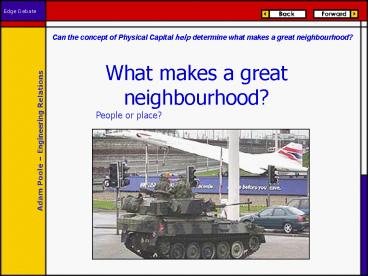What makes a great neighbourhood - PowerPoint PPT Presentation
1 / 13
Title:
What makes a great neighbourhood
Description:
Source: Richard Florida, America's Looming Creativity Crisis, Harvard Business Review, Oct 04 ... Do you build a shopping mall or do you sponsor a rock band? ... – PowerPoint PPT presentation
Number of Views:23
Avg rating:3.0/5.0
Title: What makes a great neighbourhood
1
What makes a great neighbourhood?
Edge Debate
Can the concept of Physical Capital help
determine what makes a great neighbourhood?
Adam Poole Engineering Relations
People or place?
2
Sustainable society sustainable communities
(great neighbourhoods)
The United States doesnt have some intrinsic
advantage in the cultivation of creative people,
innovative ideas, or new companies. Rather, its
real advantage lies in its ability to attract
these economic drivers from around the world. In
the 1990s alone, U.S. census figures reveal, more
than 11 million people came to America. The
largest wave of immigration in U.S.
history.Richard Florida
3
Moving forwards or backwards?
- We are currently the 4th largest economy
- Where will we be in 10 years time
- Do we plan or do we wait and see?
- The fact that we are aiming to send 50 of school
leavers to university means - we have begun to plan
- we see our future as a creative economy.
4
The Florida thesis
- Age of creative class
- The creative class inhabit places that are full
of ideas - These places tend to be diverse, tolerant and
with only a slight sense of community (quasi
anonymous) - Key question how do we create them?
5
Global Creative Class Index
Source Richard Florida, Americas Looming
Creativity Crisis, Harvard Business Review, Oct 04
6
S-Curve thinking
7
The opportunity
- Number of students educated outside their own
country - 2000 1.7 m
- 2005 8 m (UNESCO estimate)
- Foreign applications to leading US graduate
schools down by 30 - US visa applications
- Oct 00-Sep 01 6.3m
- FY2003 3.7m
- Visa delay cost to US economy 2002-04 30bn
American science is being isolated from the rest
of the world James Langer, vice president of
the National Academy of Sciences
8
The strategic importance of place
We no longer think of immigration as a
gatekeeping function but as a talent-attraction
function necessary for economic growth. Peter
Hodgson, New Zealand Minister of Research,
Science Technology
9
Planning is about manipulating the factors of
production
- The argument for considering place as physical
capital is that - it is a resource that enables the production of
other goods - it is the result of human creation (it is not a
natural resource) - it is not used up
10
But the base of the economy is changing
- We are in the business of selling ideas
- The raw materials for ideas are generally other
people - We therefore need to attract them and cluster
together
11
For the new economy
- Is physical capital the only way to understand
place? Place might also be understood in terms of
land. This is because - place enables the production of other goods it
contains the raw materials for the creative
economy people - the ideas we have and how they spark with other
people is can be considered a natural resource - arguably this is a resource that is consumed and
needs to be fertilised to remain productive
12
To develop the creative economy we need
particular sorts of places
- Places that will sustain a creative culture
- Which comes first, the people or the buildings?
- Do you enhance the land in order to harvest a
rich crop of ideas or augment the value of
physical capital? - Do you build a shopping mall or do you sponsor a
rock band?
13
This would seem to raise the following questions
- Can we sustain our position?
- Do we believe the Florida thesis?
- Do we understand place well enough to be able to
make them effective? - Do we understand this relationship well enough to
be advocating it as a matter of policy? - If so, who should lead? This sector? How could
that happen?































